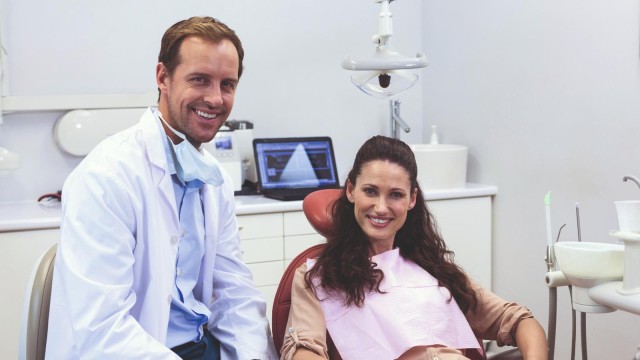Contact Kulzer International
Shaping the Change – benefit from digitalization of health information
Many patients google their symptoms and search the internet for information. When it comes to self-diagnoses, regular headaches could be terrible migraines – at least according to Dr Google. Whereas in reality, the migraine is a bruxism-induced tension headache. Dr Kenneth Lee, an expert from the University of Western Australia who has conducted studies on this phenomenon, explains how this behavior can potentially be beneficial for both patient and health professional.

Dr. Lee, is finding information online a curse or blessing for the relationship between physicians and their patients?
To my mind, it is by no means a curse – although I can imagine the new information-seeking behaviors may challenge health professionals, for example, if a patient disagrees with the professional diagnosis. This might leave some health professionals baffled, especially since they are not necessarily taught how to deal with situations like these during their university degree. Nevertheless, these new information-seeking behaviors also offer huge opportunities for the patient-physician relationship. The more openly and honestly both parties approach the issue, the more beneficial it can be. For example, a patient gets a life-changing diagnosis. To cope with it, he or she searches online for the predicted progression and possible treatments for the disease. The patient finds a recently authorized medication and brings this information to the next consultation. Together with the physician, they find out that the new medication might help, but additional information is needed. The health professional contacts the manufacturer and develops a therapy plan with and for the patient. This is an example of the benefits of patient information-seeking behaviors.
What has changed in the past years? How has Dr Google changed the information-seeking behaviors?
In the past, health professionals were the main source of information for many patients. Additional sources were, if any, relatives and friends, or print media like newspapers, books, and encyclopedias. Physicians had the prerogative of diagnosing the disease and offering treatment. If patients disagreed, they changed their physician or simply did not follow the doctor’s recommendations. In the rarest cases, patients talked or asked about alternative diagnoses or additional therapy options. The growing abundance of health-related information available online and its increasing accessibility via digital devices has made it easier for many patients to find health information by themselves. Rather than waiting for health professionals to provide the information, nowadays patients can look for it whenever they desire. Some patients even share their knowledge at the consultation and ask for clarification.

But isn’t that worrisome? Especially since so much information online the internet is not very reliable?
It can be problematic if patients are misinformed and lose trust in their physician – after all, health professionals want to offer their patients the best kind of care and aim to restore their health. But that is only one side of the issue. What is more important is that the digitalization of health information provides a great opportunity for doctors, dentists, to form stronger relationships with their patients. My research has found that most patients trust advice given by health professionals. That is why physicians should have open discussions with their patients about what information they have found and help them understand their conditions. If a patient feels a health professional is interested in their information-seeking behavior, patients may feel more comfortable with sharing their concerns.
What kind of information are patients typically looking for and where? What is the motivation for patients to seek information online?
According to my research, most patients start their search by using a search engine, rather than going to specific websites. The types of information a patient is seeking varies. Many patients look for information about their medical conditions, including ways to manage it, diets and exercise regimens that may be helpful, and treatment options. Some patients also seek out information about medications to find out if it causes certain side effects. Similarly, there are variations in patient motivations to seek information online. Besides educating themselves about the medical conditions they have, patients also want to feel prepared before their appointment and to find out more information after seeing a health professional. It’s about making informed decisions about their health management. In other cases, patients want support for coping with a diagnosis. At this point, getting in touch and connecting with other people who have the same condition is the main objective. There are also patients who look for medical information as a form of entertainment or enjoyment. For example, some patients want to find out new developments because they are interested in technology and health and want to learn about new developments. So, the information-seeking behaviors of patients are very complex.
Keeping all that in mind, which skills should both parties (doctor and patient) develop, in order to ensure a good relationship create a comfortable situation between them?
On one hand, health professionals should educate themselves about websites with accurate and easy-to-understand information so that they can recommend reliable sources to their patients. Professional associations sometimes offer information material for patients, and physicians can suggest specific information to search for, so patients do not feel overwhelmed by the volume of search results. On the other hand, patients also need to be able to restrict their searches. The internet offers millions of websites with health-related information, and trawling through them all can make a person feel like they are drowning rather than getting support. When people are overwhelmed with information, they may not understand it correctly or may only pay attention to certain parts of it. And of course, patients need to be able to evaluate the quality and accuracy of the information they find critically. The result of all these things, by the way, are informed and independent patients.
How will informed and independent patients change the daily work of a physician?
Health professionals will need to spend more time understanding patients' concerns and ensuring that patients are able to be informed decision-makers and active contributors to their own health management because patients expect to play a more active role. That's why responsibility for a patient's health will become more evenly shared between the doctor and the patient. Over time, an informed patient could mean that health professionals can treat a patient's problems more easily, rather than spending a long time identifying them. So, the focus of care will shift from a problem-oriented to a solution-oriented process. This change will empower patients and offers the opportunity to work in partnership with their doctors.
To conclude, what do you think the doctor-patient relationship will look like in 2050?
I believe that, by 2050, the patient-physician relationship will be more collaborative and equal. Health professionals will still be the experts, but patients will work with them to ensure they get the best healthcare possible. Digital devices will play a major role: physicians and patients will have easy access to health information and, most importantly, personalized data. This means that physicians will have to offer individual solutions and consultations to every single patient.
Leave a comment

-
Manager Corporate Communications
-
Matthias Brehmke
- More blog posts

